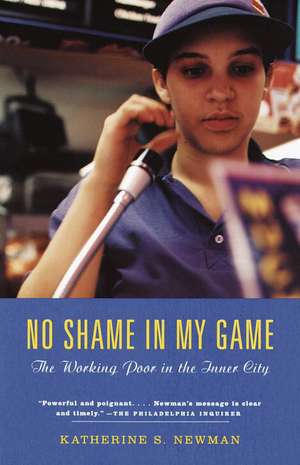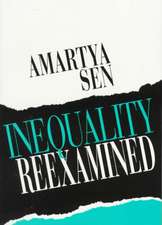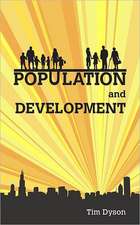No Shame in My Game: The Working Poor in the Inner City
Autor Katherine S Newman, Russell Sage Foundationen Limba Engleză Paperback – 31 mar 2000
Vezi toate premiile Carte premiată
In No Shame in My Game, Harvard anthropologist Katherine Newman gives voice to a population for whom work, family, and self-esteem are top priorities despite all the factors that make earning a living next to impossible--minimum wage, lack of child care and health care, and a desperate shortage of even low-paying jobs. By intimately following the lives of nearly 300 inner-city workers and job seekers for two yearsin Harlem, Newman explores a side of poverty often ignored by media and politicians--the working poor.
The working poor find dignity in earning a paycheck and shunning the welfare system, arguing that even low-paying jobs give order to their lives. No Shame in My Game gives voice to a misrepresented segment of today's society, and is sure to spark dialogue over the issues surrounding poverty, working and welfare.
Preț: 119.85 lei
Nou
Puncte Express: 180
Preț estimativ în valută:
22.93€ • 24.52$ • 19.12£
22.93€ • 24.52$ • 19.12£
Carte disponibilă
Livrare economică 28 martie-11 aprilie
Preluare comenzi: 021 569.72.76
Specificații
ISBN-13: 9780375703799
ISBN-10: 0375703799
Pagini: 416
Dimensiuni: 131 x 207 x 23 mm
Greutate: 0.3 kg
Editura: Vintage Publishing
Locul publicării:New York, NY
ISBN-10: 0375703799
Pagini: 416
Dimensiuni: 131 x 207 x 23 mm
Greutate: 0.3 kg
Editura: Vintage Publishing
Locul publicării:New York, NY
Notă biografică
Katherine Newman is a professor at Harvard University.
Extras
Jamal's World
From the outside, Jamal's building looks like an ordinary house that has seen better days. Shingles are strewn about the foundation and the cement steps are cracked and broken, but it is not hard to imagine that with a little bit of paint and a thorough sweeping, the place might not be too bad. A family--like Jamal's family--could live in a home like this and be comfortable.
But once you walk through the front door, all resemblance to a real home disappears. For at least a decade, the building has been broken up into separate living quarters, a rooming house with whole families squeezed into spaces that would not even qualify as bedrooms in most homes. Toilets, such as they are, sit at the end of a dark hallway. Six families take turns cooking their meals in the only kitchen and argue with one another about the provisions they have squirreled away in the refrigerator they share.
The plumbing breaks down without warning--the bane of everyone's existence. Most rooms sport windows that are cracked and broken, pieced together by duct tape that barely blocks the steady, freezing draft blowing through on a winter evening. Jamal is of the opinion that for the princely sum of $300 per month, he ought to be able to get more heat. But the landlord isn't buying his argument, so a feeble electric space heater hums away in the corner of his room, providing just enough warmth to get through the night, if you huddle under the covers and wear a lot of clothes.
Jamal's room, which he shares with his common-law wife, Kathy, is big enough for their bed, the television (tuned, always, to a shoot-'em-up western or a kung fu video), and a few shelves that hold canned goods and pasta. The walls are covered with posters of their favorite stars--Michael Jackson, Tupac Shakur--which is just as well, because the wallpaper is peeling underneath, an unsightly mess that resists any attempt to smooth the surface. The room is a major step up from the basement they used to occupy in the same building; its only windows were up near the ceiling, making fresh air scarce.
A hot plate in the corner of the room gives Kathy the freedom to cook in her "own space," even though the super would throw a fit if he knew she uses it. Fires have erupted in the past when hot plates were left on, so they have been banned for some time. Still, Jamal and Kathy are hungry for a modicum of privacy, the illusion that they live in a real home where an ordinary family can cook a meal without the hovering intrusions of neighbors who live on the other side of the bedroom wall.
Despite Kathy's best efforts to keep their clothes in good order, Jamal hates to put his things away; she gets tired of picking up after him, and they argue, a lot, about whose job it is to clean up the room. It is important to clean thoroughly, they have discovered, because among their unwanted roommates is a pack of rats. Especially in the dead of winter, when the pickings are slim outside, the rats make their way through the cracks and holes in the walls to Jamal's and Kathy's floor. Finding a rat among the shoes, Kathy notes, is among life's most repulsive experiences.
Peace and quiet are rare in the rooming house. Little kids, like two-year-old Amara next door, have nowhere to play. So they roam around and visit the families who live in the rooms nearby until their mothers, momentarily distracted from their cooking chores, come to find out where their charges have wandered. Arguments are constantly breaking out among the tenants in the house, loud voices spilling out into the hallways and through the thin walls. Close quarters breed discord, for no one has the privacy or mental space to cool off when tempers flare.
Jamal feels the walls closing in on him, on his relations with Kathy, because they are so cramped. They can barely turn around at the same time without running into each other. Jamal would like to be able to do separate things at home, like watch his favorite TV show, without getting on Kathy's nerves. He even thought about getting a divider for their room, but rejected the idea because it would simply accentuate the confinement. It does not help his temper, which has its explosive side, to be stuck in such a dump.
And he needs his rest, because at the age of twenty-two, he does a full shift whenever Burger Barn, (a pseudonym for) the fast food joint where he works, will give him the hours. In the winter of 1993, when I first came to know him, Jamal was having a good run, piling up many an eight-hour shift. At the minimum wage--then $4.25 an hour--he was earning only $34 on a good day. But if he could get enough days like that, he could keep the family's head just above water. Trouble was, he was usually only able to persuade the manager to put him on for five hours and then he'd be sent home. "Everyone wants more hours," the boss told him, "but this is all I got to give you." So Jamal would board the bus for the hour-long journey across the Bronx, glad to get off his feet, but worried about how they were going to pay this month's rent, much less the back rent he already owed.
In some ways, he was glad to leave work early. For in order to get to the job on time, he had to wake up at 4:30 a.m. and board the bus by 5:00. That was a struggle in winter when it was dark and bitter outside. Tired and freezing-cold in his thin maintenance uniform and his green khaki duffel coat, Jamal had to struggle against his own exhaustion just to make it to work. He was usually late, but not late enough to rankle the manager, a Jamaican woman who, truth be told, was often a bit late herself. Still, there were many days when all he wanted to do was jump back under the covers and forget about the job. There were all too many people in the neighborhood, God knows, who thought he was crazy to work so hard, travel so far, for the grand sum of $25 on a typical short-hour workday. Why bother?
Jamal can see their point of view. "I hate this damn job," he complains, "but it's a job. The people at [Burger Barn] are real jerks, always acting like they're better than me. But it's hard when you have no real good work experience." He allows that he'd like to find a job "where I can really be somebody who has something." If his experience of the past three or four years is any indication of what he can look forward to, this dream is a very long way off. Having pounded the pavement all over Manhattan, Queens, and the Bronx, Jamal has never been able to do better than a minimum-wage job in the fast food business.
Even these opportunities have come to him because of his "associates," young men he has encountered on the job who have helped him find new positions. Without their help, Jamal would not have done as well as he has. He would be out on the street in no time. Knowing this, he makes it his business to get to meet people. "You never know when you might need them," he points out, and in a high-turnover industry, where people are always losing hours and then losing jobs, you have to stay on your toes and keep the lines of information open.
The need for "associates" is especially strong for a young man like Jamal because employers don't exactly rush to open the door and let him in. His very physical presence is intimidating, especially to those who don't know him. The day we first met, on the campus of Columbia University where I was teaching, it was easy to pick him out from a distance. The sea of young white students parted right down the middle of the stately brick walkway to let him pass. At six feet and 220 pounds, he had the look of a pro football linebacker. With the hood of his gray sweatshirt pulled down low over his brow and a slight scowl on his face, he probably looked dangerous to this crowd. And that is exactly what most employers see coming in the door: a young black man with an attitude. What they don't see is Jamal's rounded face, almost a child's face, his luminous brown eyes, and the doting love he has for his young wife.
Over the two years that I got to know him, the Jamal I came to see was bright, perceptive beyond his years about the motives and ambitions of the people around him, and very, very depressed. At twenty-two, about the same age as many of my effervescent, optimistic undergraduate students, he was sure that he knew what his future would hold: an endless series of dead-end jobs that would condemn him, and Kathy, to life in a rat-infested tenement. He had the brains to be one of those college students, but he knew he would never, ever have that kind of chance. Instead, he was going to have to slog it out on the crosstown bus at 5:00 a.m. and spend his days cleaning out french-fry vats, catching hell from a manager "who acts better than other people." Yet the fact that he could speak so articulately and forcefully about the world he lives in and write his heart out in the diary he kept for me for over a year, told me that such a fate was a waste of a young man who could have switched places with any number of my students had his biography been different.
Still, Jamal realizes that he has a lot to be grateful for. He has a woman who loves him, even though they fight a lot over nothing. She takes care of him, fusses over him, and waits for him to come home from his job so they can share some popcorn and watch C-grade movies from the local video shop. Kathy ran away from her home in Florida, at the age of sixteen, just to be with Jamal. Her white mother was none too keen on her daughter's marrying a black man, so Kathy severed all ties to her family, save for the occasional heartbreaking call to her little brother from a pay phone. She is given to staring down at her long, shiny red fingernails when she talks about leaving her brother behind. But Kathy hardens when she talks about her mother, not just because she disapproved of Jamal but because she has been appropriating the money Social Security has sent every month since her father died. Kathy figures that money belongs to her; Mama down in Tallahassee sees the situation differently.
The money would be a big help. Kathy especially could have used it when she found out she was pregnant with Jamal's child. When their daughter was born, about six months before I met them both, the young couple had nothing to live on besides Jamal's part-time wages from Burger Barn. Kathy worked at the Barn too, for a time, but finally gave it up when the baby was born. They wedged the crib into their single room in a Brooklyn tenement and struggled to manage the piles of Pampers and a squalling child in this tiny, claustrophobic space. But Tammy developed colic and became difficult to handle. Neither Jamal nor Kathy had ever taken care of an infant before, and they didn't know what to do to make her stop crying. To his eternal regret, Jamal lost his temper one day and lashed out at the helpless child, an incident he never did quite confess to. He insisted that he had accidentally pushed the baby's crib and the little one fell out. Social Services didn't buy this, though, and they removed Tammy from her home, charging Jamal with abuse and Kathy with neglect.
When I first began spending time with the couple, you could tell that there was a hole in their hearts, a kind of grief and nervousness. They were absolutely determined to get their baby back. Every week they visited her in a family center run by the city Social Welfare Department, supervised closely by the foster mother who had temporary custody of Tammy. They attended parenting classes, trying to learn how to take better care of the little girl--how to change diapers, hold a bottle, and tolerate the mind-numbing cries of a newborn. Just the sight of Tammy, now six months old, turned them emotionally inside out. Jamal marveled at "how big she is getting to be." Kathy just wanted to hold her, give her toys to play with, make sure she remembered what her real mother looks like.
From the outside, Jamal's building looks like an ordinary house that has seen better days. Shingles are strewn about the foundation and the cement steps are cracked and broken, but it is not hard to imagine that with a little bit of paint and a thorough sweeping, the place might not be too bad. A family--like Jamal's family--could live in a home like this and be comfortable.
But once you walk through the front door, all resemblance to a real home disappears. For at least a decade, the building has been broken up into separate living quarters, a rooming house with whole families squeezed into spaces that would not even qualify as bedrooms in most homes. Toilets, such as they are, sit at the end of a dark hallway. Six families take turns cooking their meals in the only kitchen and argue with one another about the provisions they have squirreled away in the refrigerator they share.
The plumbing breaks down without warning--the bane of everyone's existence. Most rooms sport windows that are cracked and broken, pieced together by duct tape that barely blocks the steady, freezing draft blowing through on a winter evening. Jamal is of the opinion that for the princely sum of $300 per month, he ought to be able to get more heat. But the landlord isn't buying his argument, so a feeble electric space heater hums away in the corner of his room, providing just enough warmth to get through the night, if you huddle under the covers and wear a lot of clothes.
Jamal's room, which he shares with his common-law wife, Kathy, is big enough for their bed, the television (tuned, always, to a shoot-'em-up western or a kung fu video), and a few shelves that hold canned goods and pasta. The walls are covered with posters of their favorite stars--Michael Jackson, Tupac Shakur--which is just as well, because the wallpaper is peeling underneath, an unsightly mess that resists any attempt to smooth the surface. The room is a major step up from the basement they used to occupy in the same building; its only windows were up near the ceiling, making fresh air scarce.
A hot plate in the corner of the room gives Kathy the freedom to cook in her "own space," even though the super would throw a fit if he knew she uses it. Fires have erupted in the past when hot plates were left on, so they have been banned for some time. Still, Jamal and Kathy are hungry for a modicum of privacy, the illusion that they live in a real home where an ordinary family can cook a meal without the hovering intrusions of neighbors who live on the other side of the bedroom wall.
Despite Kathy's best efforts to keep their clothes in good order, Jamal hates to put his things away; she gets tired of picking up after him, and they argue, a lot, about whose job it is to clean up the room. It is important to clean thoroughly, they have discovered, because among their unwanted roommates is a pack of rats. Especially in the dead of winter, when the pickings are slim outside, the rats make their way through the cracks and holes in the walls to Jamal's and Kathy's floor. Finding a rat among the shoes, Kathy notes, is among life's most repulsive experiences.
Peace and quiet are rare in the rooming house. Little kids, like two-year-old Amara next door, have nowhere to play. So they roam around and visit the families who live in the rooms nearby until their mothers, momentarily distracted from their cooking chores, come to find out where their charges have wandered. Arguments are constantly breaking out among the tenants in the house, loud voices spilling out into the hallways and through the thin walls. Close quarters breed discord, for no one has the privacy or mental space to cool off when tempers flare.
Jamal feels the walls closing in on him, on his relations with Kathy, because they are so cramped. They can barely turn around at the same time without running into each other. Jamal would like to be able to do separate things at home, like watch his favorite TV show, without getting on Kathy's nerves. He even thought about getting a divider for their room, but rejected the idea because it would simply accentuate the confinement. It does not help his temper, which has its explosive side, to be stuck in such a dump.
And he needs his rest, because at the age of twenty-two, he does a full shift whenever Burger Barn, (a pseudonym for) the fast food joint where he works, will give him the hours. In the winter of 1993, when I first came to know him, Jamal was having a good run, piling up many an eight-hour shift. At the minimum wage--then $4.25 an hour--he was earning only $34 on a good day. But if he could get enough days like that, he could keep the family's head just above water. Trouble was, he was usually only able to persuade the manager to put him on for five hours and then he'd be sent home. "Everyone wants more hours," the boss told him, "but this is all I got to give you." So Jamal would board the bus for the hour-long journey across the Bronx, glad to get off his feet, but worried about how they were going to pay this month's rent, much less the back rent he already owed.
In some ways, he was glad to leave work early. For in order to get to the job on time, he had to wake up at 4:30 a.m. and board the bus by 5:00. That was a struggle in winter when it was dark and bitter outside. Tired and freezing-cold in his thin maintenance uniform and his green khaki duffel coat, Jamal had to struggle against his own exhaustion just to make it to work. He was usually late, but not late enough to rankle the manager, a Jamaican woman who, truth be told, was often a bit late herself. Still, there were many days when all he wanted to do was jump back under the covers and forget about the job. There were all too many people in the neighborhood, God knows, who thought he was crazy to work so hard, travel so far, for the grand sum of $25 on a typical short-hour workday. Why bother?
Jamal can see their point of view. "I hate this damn job," he complains, "but it's a job. The people at [Burger Barn] are real jerks, always acting like they're better than me. But it's hard when you have no real good work experience." He allows that he'd like to find a job "where I can really be somebody who has something." If his experience of the past three or four years is any indication of what he can look forward to, this dream is a very long way off. Having pounded the pavement all over Manhattan, Queens, and the Bronx, Jamal has never been able to do better than a minimum-wage job in the fast food business.
Even these opportunities have come to him because of his "associates," young men he has encountered on the job who have helped him find new positions. Without their help, Jamal would not have done as well as he has. He would be out on the street in no time. Knowing this, he makes it his business to get to meet people. "You never know when you might need them," he points out, and in a high-turnover industry, where people are always losing hours and then losing jobs, you have to stay on your toes and keep the lines of information open.
The need for "associates" is especially strong for a young man like Jamal because employers don't exactly rush to open the door and let him in. His very physical presence is intimidating, especially to those who don't know him. The day we first met, on the campus of Columbia University where I was teaching, it was easy to pick him out from a distance. The sea of young white students parted right down the middle of the stately brick walkway to let him pass. At six feet and 220 pounds, he had the look of a pro football linebacker. With the hood of his gray sweatshirt pulled down low over his brow and a slight scowl on his face, he probably looked dangerous to this crowd. And that is exactly what most employers see coming in the door: a young black man with an attitude. What they don't see is Jamal's rounded face, almost a child's face, his luminous brown eyes, and the doting love he has for his young wife.
Over the two years that I got to know him, the Jamal I came to see was bright, perceptive beyond his years about the motives and ambitions of the people around him, and very, very depressed. At twenty-two, about the same age as many of my effervescent, optimistic undergraduate students, he was sure that he knew what his future would hold: an endless series of dead-end jobs that would condemn him, and Kathy, to life in a rat-infested tenement. He had the brains to be one of those college students, but he knew he would never, ever have that kind of chance. Instead, he was going to have to slog it out on the crosstown bus at 5:00 a.m. and spend his days cleaning out french-fry vats, catching hell from a manager "who acts better than other people." Yet the fact that he could speak so articulately and forcefully about the world he lives in and write his heart out in the diary he kept for me for over a year, told me that such a fate was a waste of a young man who could have switched places with any number of my students had his biography been different.
Still, Jamal realizes that he has a lot to be grateful for. He has a woman who loves him, even though they fight a lot over nothing. She takes care of him, fusses over him, and waits for him to come home from his job so they can share some popcorn and watch C-grade movies from the local video shop. Kathy ran away from her home in Florida, at the age of sixteen, just to be with Jamal. Her white mother was none too keen on her daughter's marrying a black man, so Kathy severed all ties to her family, save for the occasional heartbreaking call to her little brother from a pay phone. She is given to staring down at her long, shiny red fingernails when she talks about leaving her brother behind. But Kathy hardens when she talks about her mother, not just because she disapproved of Jamal but because she has been appropriating the money Social Security has sent every month since her father died. Kathy figures that money belongs to her; Mama down in Tallahassee sees the situation differently.
The money would be a big help. Kathy especially could have used it when she found out she was pregnant with Jamal's child. When their daughter was born, about six months before I met them both, the young couple had nothing to live on besides Jamal's part-time wages from Burger Barn. Kathy worked at the Barn too, for a time, but finally gave it up when the baby was born. They wedged the crib into their single room in a Brooklyn tenement and struggled to manage the piles of Pampers and a squalling child in this tiny, claustrophobic space. But Tammy developed colic and became difficult to handle. Neither Jamal nor Kathy had ever taken care of an infant before, and they didn't know what to do to make her stop crying. To his eternal regret, Jamal lost his temper one day and lashed out at the helpless child, an incident he never did quite confess to. He insisted that he had accidentally pushed the baby's crib and the little one fell out. Social Services didn't buy this, though, and they removed Tammy from her home, charging Jamal with abuse and Kathy with neglect.
When I first began spending time with the couple, you could tell that there was a hole in their hearts, a kind of grief and nervousness. They were absolutely determined to get their baby back. Every week they visited her in a family center run by the city Social Welfare Department, supervised closely by the foster mother who had temporary custody of Tammy. They attended parenting classes, trying to learn how to take better care of the little girl--how to change diapers, hold a bottle, and tolerate the mind-numbing cries of a newborn. Just the sight of Tammy, now six months old, turned them emotionally inside out. Jamal marveled at "how big she is getting to be." Kathy just wanted to hold her, give her toys to play with, make sure she remembered what her real mother looks like.
Recenzii
"[Newman] balances the personal experience of her subjects with thorough reasearch, analysis, and ideas for policy reform but the stories of the people working for minimum wage are what stay with you." --The New Yorker
"Extremely valuable...extremely engaging."--The Denver Post
"Extremely valuable...extremely engaging."--The Denver Post
Textul de pe ultima copertă
In No Shame in My Game, Harvard anthropologist Katherine Newman gives voice to a population for whom work, family, and self-esteem are top priorities despite all the factors that make earning a living next to impossible -- minimum wage, lack of child care and health care, and a desperate shortage of even low-paying jobs. By intimately following the lives of nearly 300 inner-city workers and job seekers for two years in Harlem, Newman explores a side of poverty often ignored by media and politicians -- the working poor.
These workers persevere in a country that, more than any other, measures self-worth through employment but deems "hamburger flipping" jobs unworthy. The working poor find dignity in earning a paycheck and shunning the welfare system, arguing that even low-paying jobs give order to their lives. No Shame in My Game shows us a misrepresented segment of today's society, and is sure to spark dialogue over the issues surrounding poverty, working, and welfare.
Premii
- Robert F. Kennedy Book Award Winner, 2000
- Street Literature Book Award Medal (Slbam) Honorable Mention, 2001













